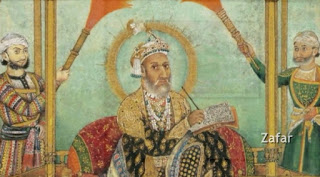World History
He was the last Mughal emperor. He came to the throne with nothing "of the power and wealth of his ancestors." He was at the center of the Great Uprising against the British in 1857 and was arrested soon thereafter. Nonetheless, in the eight-mintue clip above, William Dalrymple, author of the The Last Mughal, notes that Zafar created a literary renaissance in Dehli. According to Dalrymple, Zafar's court "did for Urdu poetry what Queen Elizabeth's court did for English poetry." The renissance was accomplished because of Zafar's example. He was a poet, an artist and writer himself.
- Aurangzeb - Emperor Of India
Aurangzeb - Emperor of India Aurangzeb was the sixth Mughal emperor (r. 1658–1707). He ruled for 49 years as Emperor Alamgir (conqueror of the universe); he was the last great ruler of the Mughal dynasty, but left the empire economically exhausted...
- Jahangir - Mughal Ruler
Jahangir - Mughal RulerJahangir inherited the Mughal throne from his father, Akbar, the greatest Mughal emperor. His realm included part of Afghanistan and the Indian subcontinent up to the Deccan. It was one of the largest empires of the world and enjoyed...
- Shah Jahan - Mughal Emperor
Shah Jahan - Mughal EmperorMughal emperor Jahangir’s death and the following succession struggle ended in the triumph of his son, Prince Khurram, who took the title Shah Jahan, which means “emperor of the world.†He killed his male...
- The John Hampden Society
The John Hampden Society. A society devoted to the study of 17th-century Parliamentarian John Hampden, who famous for resisting the King's illegal Ship Money tax. From the site: John Hampden was descended from an ancient Buckinghamshire family of...
- The English East India Company: Original Corporate Raiders
Here is a long but excellent essay about the East India Company by William Dalrymple, author of several books about India, including The Last Mughal. Dalrymple reminds us of the greed and brutality that members of the East India Company employed in conquering...
World History
Zafar: The Last Mughal Empeor
He was the last Mughal emperor. He came to the throne with nothing "of the power and wealth of his ancestors." He was at the center of the Great Uprising against the British in 1857 and was arrested soon thereafter. Nonetheless, in the eight-mintue clip above, William Dalrymple, author of the The Last Mughal, notes that Zafar created a literary renaissance in Dehli. According to Dalrymple, Zafar's court "did for Urdu poetry what Queen Elizabeth's court did for English poetry." The renissance was accomplished because of Zafar's example. He was a poet, an artist and writer himself.

- Aurangzeb - Emperor Of India
Aurangzeb - Emperor of India Aurangzeb was the sixth Mughal emperor (r. 1658–1707). He ruled for 49 years as Emperor Alamgir (conqueror of the universe); he was the last great ruler of the Mughal dynasty, but left the empire economically exhausted...
- Jahangir - Mughal Ruler
Jahangir - Mughal RulerJahangir inherited the Mughal throne from his father, Akbar, the greatest Mughal emperor. His realm included part of Afghanistan and the Indian subcontinent up to the Deccan. It was one of the largest empires of the world and enjoyed...
- Shah Jahan - Mughal Emperor
Shah Jahan - Mughal EmperorMughal emperor Jahangir’s death and the following succession struggle ended in the triumph of his son, Prince Khurram, who took the title Shah Jahan, which means “emperor of the world.†He killed his male...
- The John Hampden Society
The John Hampden Society. A society devoted to the study of 17th-century Parliamentarian John Hampden, who famous for resisting the King's illegal Ship Money tax. From the site: John Hampden was descended from an ancient Buckinghamshire family of...
- The English East India Company: Original Corporate Raiders
Here is a long but excellent essay about the East India Company by William Dalrymple, author of several books about India, including The Last Mughal. Dalrymple reminds us of the greed and brutality that members of the East India Company employed in conquering...
